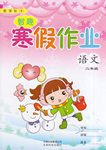题目内容
假如你是李华,你刚收到了你的朋友王梅的电子邮件,她在 邮件里向你询问在高中如何学好英语。 请你根据下列的内容给她 写封回信。
1. 上课认真听讲,做好笔记,课后及时复习;
2. 词汇是基础,每天早上花半个小时的时间背诵单词,朗读 课文;
3. 课外多与同学用英语交流,提高听力和口语能力;
4. 每天坚持写日记。
注意:1.词数 100 词左右,短文的开头和结尾已为你写好,不计入总数;2.内容可适当发挥,注意行文连贯。
Dear Wang Mei, I’m very glad to have received your e-mail.
____________________________________________________________________________________________
____________________________________________________________________________________________
____________________________________________________________________________________________
____________________________________________________________________________________________
____________________________________________________________________________________________
____________________________________________________________________________________________
_______________________________________________________________________
Best wishes!
Yours,
Li Hua
 智趣寒假作业云南科技出版社系列答案
智趣寒假作业云南科技出版社系列答案| A. | from which | B. | for which | C. | at which | D. | in which |


 u’re in trouble on that date if you lend someone something,because you won’t get it back!In India,March 31 is the day for tricks. Portuguese,who celebrate on the Sunday or Monday before the Christian holiday of Lent,throw flour on their friends. People in England say playing tricks after noon on April 1 brings bad luck to the jokers. The U.S. holiday doesn’t have special traditions.
u’re in trouble on that date if you lend someone something,because you won’t get it back!In India,March 31 is the day for tricks. Portuguese,who celebrate on the Sunday or Monday before the Christian holiday of Lent,throw flour on their friends. People in England say playing tricks after noon on April 1 brings bad luck to the jokers. The U.S. holiday doesn’t have special traditions.